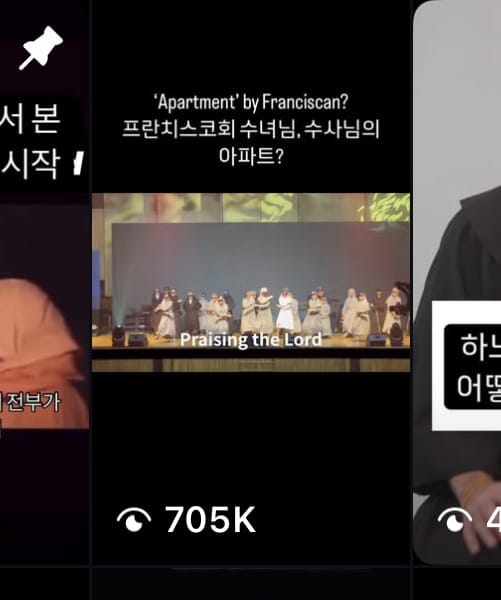When the Sacred Meets Social Media: Defending the Rich Tradition of Korean Catholicism

Recently, one of my Instagram posts has gone viral, reaching over 700,000 views. It’s been an unexpected but deeply thought-provoking experience.
The video captured a moment during Vocation Sunday, where various religious orders gathered to engage with youth and young adults in a more approachable way. In particular, the Franciscan brothers and sisters prepared a performance of dance and music to connect with the young people, offering it as a joyful gift.
After I shared the video, it quickly became a viral video in instagram. From what I could tell, about 60–70% of the comments were positive, while around 30–40% expressed concerns or criticism. Many comments showed curiosity about the Korean Catholic Church, and some questioned its sense of tradition.


In response, I felt a sense of responsibility—not only as the one who posted the video, but also as someone who loves the Church and wants to reflect honestly on this moment. I’d like to share two thoughts.
1. On Evangelization and Culture
C.S. Lewis once said that God can use anything as a tool for proclaiming the Gospel. I believe that those who serve in ministry must be willing to use whatever helps spread the Good News—and also be ready to let go of anything that doesn’t.
From this perspective, I think we should remain open to the possibility of using popular culture as a means of evangelization. Even if the song adapted by the Franciscans originally came from a secular source, the fact that it was rewritten to reflect the values of religious life, and performed in a way that made the friars seem more accessible and relatable—especially to children and youth—can be a powerful tool for ministry.
Sometimes, before we share something beautiful, we must first become friends. In youth ministry, this kind of approach requires thoughtful discernment and context, but it can be incredibly meaningful.
2. On the Rich Tradition of the Korean Church
The Korean Catholic Church has a unique and beautiful history. Unlike many countries, Christianity here was not introduced by foreign missionaries or clergy. Instead, it began through the initiative of laypeople, who discovered the Gospel and embraced it as a source of hope and truth.
In the late Joseon Dynasty, Catholic teachings were first encountered by scholars exploring new ideas for social reform. These teachings touched their hearts and opened them to the love of Jesus. Even before priests or religious arrived in Korea, these lay believers created a living Church and community of faith.
That faith was tested and matured through waves of brutal persecution. Thousands of Korean Christians gave their lives as martyrs, bearing witness to their faith. In recognition of this, Pope St. John Paul II canonized 1 of Korean martyrs—heroes of our faith.

With this in mind, I cannot agree with the notion that our Church lacks tradition or depth. On the contrary, as a lay member of the Archdiocese of Seoul, I can say with confidence that many faithful here are living out a vibrant and profound spirituality.
I’ve seen it with my own eyes—in our liturgies, in the dedicated lives of religious, in the faithful witness of laypeople, and in the passionate voices of young Catholics who are eager to share their faith. This is why I run a YouTube channel: to share this beauty with others and to bear witness to the living presence of Christ in Korea.
When it was announced that World Youth Day would be held in Seoul in 2027, I felt tremendous joy. It gave me hope that the beauty of Korean Catholicism might be shared with the world.
I sincerely hope that I can continue playing a small part in this mission—as a kind of “digital missionary”—because I truly believe that bearing witness to this faith is something of great value.
Thank you for reading this long reflection. If you have any questions or would like to hear more, feel free to reach out. God bless you.
